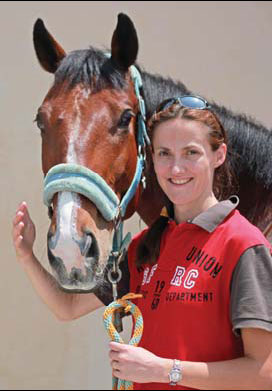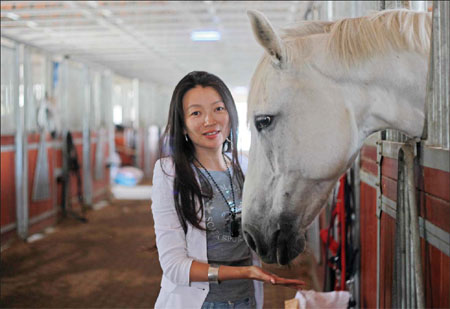An equestrian club where it's not just horse play
Updated: 2012-07-13 12:33
By Zhao Yanrong (China Daily)
|
|||||||||||
|
Top: Wang Qiang, manager of Equuleus International Equestrian Center. Above: Alix Dourdin, a member who started riding at Equuleus last July. Photos by Wang Jing / China Daily |

The moneyed classes of Beijing take to the saddle, and it does not come cheaply
Three months ago the Equuleus International Equestrian Center stood on a pedestal all by itself - it had been given a stamp of approval by the British Horse Society for standards of welfare, health, safety and instruction, becoming the first Chinese riding center to receive the honor.
Most equestrian clubs in China are just-for-fun outfits that burn a lot of money of their investors, rich Chinese business people who are keen on sport, but the manager of Equuleus, Wang Qiang, says she is taking the business seriously.
In running the club, she is carrying a professional equestrian team on her shoulders, an exercise that is not only arduous physically but that costs millions of yuan as it takes part in competitions nationwide.
"I love horse riding and enjoy the elegant movements of equestrianism," says Wang, who, when the riding club was set up in 1999, was a mere member.
"The club owner couldn't give it the attention it needed and asked if I wanted to become a joint investor and deal with the management work."
Though she does not ride horses that often, Wang has gained enough skills to graduate from club member to professional club manager in the space of 12 years.
Being a traditional Western sport, equestrianism in China is tightly tethered to Western rules and culture. Over the years most members of Equuleus - a Latin word meaning foal - have tended to be foreigners from the moneyed areas of the capital, including Beijing Riviera, Cathay View and Quanfa Garden.
Ten years ago Wang and her team started venturing to Europe to buy horses for the club. They knew little about European prices, let alone how much they should cost, she says, which meant that more than once the Chinese group fell victim to unscrupulous dealers cashing in on their ignorance.
Five years ago Equuleus' members started buying Warmblood horses - ones that are mainly used for the sport - that may cost hundreds of thousands of euros, through the club's international business.
Because of the strong demand in the club for European horses, Wang has to travel to the continent three times a year, and she has become familiar with dozens of breeders and dealers there.
The growing interest in equestrianism in China is reflected in Equuleus' active membership, 500 now, compared with fewer than 20 when it started.
"The horses and trainers are usually fully booked over weekends, and many school students are sent by their parents to take riding courses with us as well," Wang says.
The original stable with 20 boxes in the center has been extended many years ago. However, the current 120 boxes are still not enough to host all the horses. The total area of the center is double what it was at the start.
"We can feel the growing enthusiasm from the market, while our membership started booming since 2007. In earlier years, it took longer for our members to make the final decision of buying an imported horse from us," Wang says.
"But now, they have more knowledge of the industry and sport. The horses we get from overseas are often brought by members soon after the horses arrive in China. Some members order specific horses before we set off overseas."
About 70 imported Warmbloods from Europe that belong to private horse owners live at the center. Such care does not come cheaply.
Alix Dourdin is a French woman who started riding at Equuleus last July. She paid 90,000 yuan ($14,000, 11,500 euros) for a full year's membership, which includes leasing and boarding the horse, as well as training sessions.
"The annual fee for membership at a local club near where I am from, the greater Paris area, is only about 20,000 yuan," says Dourdin, 36, a housewife.
Dourdin, who moved to Beijing with her husband from Seoul last year, says: "Some French people I know choose not to ride in China because of the high cost."
Thanks to the increasing passion of club members, Wang and her team can cover the cost of a provincial-level equestrian team - six imported Warmbloods and four professional equestrian riders.
The center's team has taken part in many national competitions, on the back of which the club has been able to branch out into commercial activities such as renting out horses and riders used for promotional purposes.
Wu Zhala, editor-in-chief of the Chinese National Equestrian Website, www.horse.org.cn, says: "Many riding clubs are built as a clubhouse for socializing, with well decorated bars and rest areas for club members. But they put human interest over the horses', which is contrary to the spirit of the sport.
"Unless you have good service and train horses, it is hard to maintain their capabilities, which is no good for training members."
Equuleus is outstanding in this regard, he says.
While Equuleus' stables lack the size and the fancy finishing touches of most newly established equestrian clubs, Wang says she makes sure the horses have a comfortable environment to live in. For example, some of the sand and grass is imported from the Netherlands.
Every year Wang sends a few Equuleus trainers to Europe and the United States for advanced training. Trainers from Britain, the Netherlands and Belgium are hired for a few months each year, which is not a cheap exercise, since international trainers typically cost three to five times what Chinese coaches cost.
In addition, vets and farriers are based at Equuleus, something that not all horse riding centers do.
"Unlike most horse riding centers' millionaire owners, we run the center as a business to achieve a success," Wang says. "So we spend more on the horses than on facilities for people, but we benefit a lot from it."
Though Equuleus has become one of the leading equestrian clubs in China, Wang says the lack of regulation in the industry remains a concern.
Prices of horses can change randomly, she says, and competitions can be unfair. In addition, there is a shortage of medicine and personnel for the industry.
"We aren't just focused on our own business, but on the industry as a whole. Only in an improved business environment can we get better.
"China is a special market, and is just getting started, and we want ... a better system with much more developed regulations."
zhaoyanrong@chinadaily.com.cn
(China Daily 07/13/2012 page15)
Today's Top News
Rescuers race against time for quake victims
Telecom workers restore links
Coal mine blast kills 18 in Jilin
Intl scholarship puts China on the map
More bird flu patients discharged
Gold loses sheen, but still a safe bet
US 'turns blind eye to human rights'
Telecom workers restore links
Hot Topics
Lunar probe , China growth forecasts, Emission rules get tougher, China seen through 'colored lens', International board,
Editor's Picks

|

|

|

|

|

|






